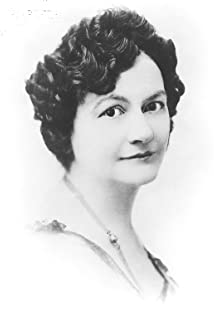Lucille La Verne
A legendary stage actress and character player in early films, Lucille La Verne is one of those forgotten legends who seem to fade as the years go on. However, at her prime she was one of the most acclaimed actresses of her generation.
Lucille La Verne Mitchum was born in Nashville, Tennessee, on November 7, 1872. Little is known about her family. She made her stage debut at the local summer stock theater in 1876. The production was called "Centennial" in honor of America's 100th birthday, and the three-year old Lucille was among a handful of child extras in the play. In 1878 she returned to play another child part. She continued to return every summer, sort of becoming the playhouse's resident child star. She quickly proved herself a talented actress, and as she got older she was given better parts. She won great acclaim when during the summer of 1887 she played both Juliet and Lady Macbeth--at only 14 years of age.
On the night of her 16th birthday in 1888, made her Broadway debut with a supporting role in "La Tosca". The play closed after four weeks. In the fall of 1889 she performed with a stock company in Washington, DC, where she played May in "May Blossom" and Chrissy Rogers in "The Governess". She also toured as Ethel in "Judge Not". Her breakthrough performance was a limited-run Broadway revival of "As You Like It" with an all-female cast in March 1894, and she won much acclaim for her performance as "Corin". In the 1894-95 season, she played Patsy in Frank Mayo's Broadway production of Mark Twain's "Pudd'nhead Wilson". She also scored great success by playing the female lead roles in three different acclaimed touring productions over the next three years: "Notre Dame" (1895-96), "Uncle Tom's Cabin" (1897-98) and "Lady Windermere's Fan" (1897-98). In 1898 La Verne was made manager and director of the newly built Empire Theater in Richmond, VA. She staged five shows every season, and received mostly rave reviews. She played everything from leading roles in "Hedda Gabbler" and "Antigone" to character parts such as "Ma Frochard" in "The Two Orphans." She also wrote an adaptation of Charles Dickens' "A Christmas Carol", which she first staged in 1900, and her version was used by several other theaters in the early 1900s. She received much acclaim for her work at the Empire, and even received the Woman of the Year Award from the Virginia Women's Society in 1901.

